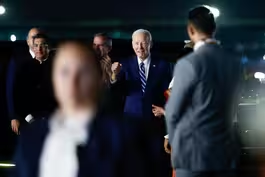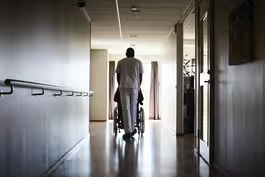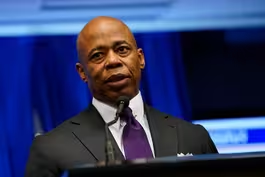
Brooks and Capehart on the Hunter Biden investigation
Clip: 9/8/2023 | 10m 17sVideo has Closed Captions
Brooks and Capehart on the Hunter Biden investigation and migrant crisis in New York
New York Times columnist David Brooks and Washington Post associate editor Jonathan Capehart join Amna Nawaz to discuss the week in politics, including a Georgia grand jury recommending charges for 21 additional Trump allies in the election case, federal prosecutors seeking an indictment against Hunter Biden and the migrant crisis in New York City.
Problems playing video? | Closed Captioning Feedback
Problems playing video? | Closed Captioning Feedback
Major corporate funding for the PBS News Hour is provided by BDO, BNSF, Consumer Cellular, American Cruise Lines, and Raymond James. Funding for the PBS NewsHour Weekend is provided by...

Brooks and Capehart on the Hunter Biden investigation
Clip: 9/8/2023 | 10m 17sVideo has Closed Captions
New York Times columnist David Brooks and Washington Post associate editor Jonathan Capehart join Amna Nawaz to discuss the week in politics, including a Georgia grand jury recommending charges for 21 additional Trump allies in the election case, federal prosecutors seeking an indictment against Hunter Biden and the migrant crisis in New York City.
Problems playing video? | Closed Captioning Feedback
How to Watch PBS News Hour
PBS News Hour is available to stream on pbs.org and the free PBS App, available on iPhone, Apple TV, Android TV, Android smartphones, Amazon Fire TV, Amazon Fire Tablet, Roku, Samsung Smart TV, and Vizio.
Providing Support for PBS.org
Learn Moreabout PBS online sponsorshipAMNA NAWAZ: It's been a busy week in politics in Washington and across the country.
To delve deeper into all of it, we turn now to the analysis of Brooks and Capehart.
That's New York Times columnist David Brooks, and Jonathan Capehart, associate editor for The Washington Post.
And welcome to you both.
It's great to see you.
David, let's start with this news we learned today about the report from the special grand jury in Georgia that basically shows there were 21 other people they recommended be indicted that the DA there, Fani Willis, decided not to indict.
The fact that 21 Fulton County residents looked all this evidence for months, heard from all these witnesses, said, yes, we think these people, three senators, a former senior White House official, should be indicted, what does that say to you about the strength and the scope of that case?
DAVID BROOKS: Well, I think it may be a strong case.
I imagine it's a pretty strong case against the indicted 19.
But back many, many years ago, when Rudy Giuliani was still a semi-normal person, he was indicting people on Wall Street.
And he used the RICO statute to roll up lots and lots of people.
And his critics said RICO is just badly structured and that you can get -- you can roll up masses of people whether they're really involved in the core indictment -- the core conspiracy or not.
So I worry that RICO was once against used to broaden that out to anybody who was supporting Donald Trump.
And I'm glad the prosecutors in the end picked the 19, because we just don't need to be rolling up anybody who supports Donald Trump.
That weakens the case against the core people who actually were involved in the conspiracy.
AMNA NAWAZ: Jonathan, what did you make of that when you heard that news, the decision not to indict people like Senator Graham, former Georgia Senators Perdue and Loeffler, former National Security Adviser Michael Flynn?
What was your reaction?
JONATHAN CAPEHART: My reaction was, one, the restraint of the prosecution, to David's point, but also the fact that there was a footnote.
There was a footnote on, I can't remember which page, but it's footnote number six.
And it explained why one of the people on the grand jury voted against indicting Loeffler and Perdue.
And it was because they were concerned -- they saw that what they did was political and not part of the conspiracy.
And when I read that footnote, it made me, hmm, is this the venue, the avenue that Donald Trump will be able to use to get out from under his indictment, to get a jury to find him not guilty or to say that he wasn't part of this conspiracy?
I don't know.
But the overall thing, Amna, that I take away from this is that a lot of attention has been focused on DA Fani Willis and her motivations and her skill.
And what we're seeing with every release, with every document, it is that she is more than up to the task of try -- of bringing this case, and she is running a well-oiled, very smart shop.
AMNA NAWAZ: I just want to say, leave it to Jonathan Capehart to be digging into the footnotes on this.
Thank you for that.
DAVID BROOKS: I read the bibliography behind the footnotes.
So I... (LAUGHTER) AMNA NAWAZ: OK. You get credit as well.
I do want to talk about other legal news this week, though.
We learned federal prosecutors will be moving ahead with an indictment against Hunter Biden, most likely related to gun charges, expected by the end of the month.
David, as you well know, those questions around Hunter Biden continue to fuel Republicans' threats to impeach President Biden.
Is this becoming a liability for the president?
DAVID BROOKS: Well, it's certainly a liability.
It sort of feeds into the narrative that he's part of the Washington establishment, everybody's self-dealing.
So that's a liability.
The gun charge, he was a sick man, frankly, who had some drug issues.
And the gun charge, to me, is an ancillary issue.
To me, I want to know -- he was clearly trying to peddle influence.
Did he successfully peddle influence?
Was any law changed?
Did Joe Biden's policies change?
Did Joe Biden sit on any of those meetings?
I kind of doubt it on all counts.
But I do think now I have sort of underestimated the Hunter Biden story.
I think it's probably worth a look to see if there was actual influence peddling.
But, for the Republicans to talk about impeachment, you got to have a crime.
Like, you got to have some accusation you can make.
And they don't really have anything right now.
It's worth looking into, but they're way premature in talking about impeachment.
AMNA NAWAZ: Jonathan, what do you make of that?
Is it worth a look by both the Department of Justice and House Republicans, as they say they want to do?
JONATHAN CAPEHART: Well, it's worth a look by the Department of Justice, because they're already looking.
And with the special counsel having already been appointed, there apparently is a reason to look.
But the one thing I want folks to remember, and to always remember, and that is the legal predicament surrounding Hunter Biden, the son of the president, it is nowhere near and it is not the same as what is facing the former president.
twice impeached, four times indicted on 91 counts in four different jurisdictions.
I mean, they're -- Republicans, especially congressional Republicans, have been spending a lot of time trying to focus attention on Hunter Biden and the -- quote, unquote -- "weaponization" of the Justice Department because of what is happening to Donald Trump, as opposed to focusing in on the fact that the guy has got four indictments, 91 counts for some very serious, very serious crimes, but also affronts to American democracy.
And that is nowhere near -- what Hunter Biden may or may not have done does not even come close to the level of legal drama that's facing the former president of the United States.
AMNA NAWAZ: David, does this fuel that political whataboutism?
DAVID BROOKS: Yes.
AMNA NAWAZ: Someone says, Trump's indicted and they say, well, what about Hunter Biden?
DAVID BROOKS: Yes, well, whataboutism is not the greatest thing to be doing.
So I do think I agree with John other than 100 percent it's not even close.
It's, like, what Donald Trump admits to doing is a way worse than what the Bidens deny doing.
Nonetheless, he's the son of the president.
He's got lots of money from the Ukrainians.
He's got lots of money from the Chinese.
There's a reason he got lots of money.
And it's not because of his skills.
It's because his last name is Biden.
And so when you get a case like that, set aside what needs to be done to Donald Trump, it's worth looking into.
And it's worth answering the fears that a lot of people have, which is, they're focusing on the gun issues, which is trivial, frankly, so they don't focus on the real issues, which is the influence peddling.
AMNA NAWAZ: Jonathan, I want to ask you about the interview that Geoff did earlier with New York City Mayor Eric Adams.
His city is one of many that's under pressure, as you have more numbers of migrants arriving from the Southern border and making their way into different cities across the country.
And he's among the many Democratic leaders who are now criticizing the president, saying, you need to do more.
We need more help.
Is that criticism fair?
JONATHAN CAPEHART: The criticism is fair, if you also keep in mind that he's focusing on the president because he's the president.
But he also, in his criticism, talked about Congress, talked about the federal government, talked about Washington.
And so that is an acknowledgement of the fact that, yes, he can yell at the president because the president is a member of his own party and someone who will listen to him.
But if there's ever going to be anything done about what's happening at the border, about what's happening about those migrants that those Republican governors are using as human pawns, sending them to Democratic - - Democratically run cities and states, you're going to need Democrats and Republicans in Congress to sit down like adults and come up with a comprehensive immigration plan that can pass both chambers and get the president's signature.
This is a federal issue.
And, by federal, it is not just the president.
It is Congress has to give the president something he can sign.
And so I understand the mayor's frustration.
I understand Governor Pritzker's frustration in Illinois, Governor Hochul's frustration in New York.
At some point, the focus has to shift from President Biden to Congress, and particularly Republicans on Capitol Hill, who I'm old enough to remember and I'm sure David is old enough to remember when Senator John McCain was working real hard with Senator Lindsey Graham to come up with a comprehensive immigration bill, and it failed.
AMNA NAWAZ: David, what's your take?
Are there Republicans who want to see that comprehensive immigration reform?
DAVID BROOKS: Yes, they're hiding in the closets, but there are still a few of them.
(LAUGHTER) DAVID BROOKS: They're all in the old folks home with, whatever, Lindsey Graham.
I guess I'd say, at first, obviously, Jonathan's right.
We have to fix the immigration system.
Republicans need to understand that we need immigrants and we need to open the door.
Democrats need to understand we need to control our borders and that you have to use the language of fences or whatever.
They can avoid the word walls if they want to, but we just have to control our borders.
And if you're going to have a sanctuary city or whatever you're going to do and say, welcome, people, come here, then, when the people are allowed to come in through our dysfunctional system, they're going to come to your city, it's going to cost you a lot of money.
And so I think Democrats just have to understand.
My colleague Tom Friedman puts it well.
We need a big wall with a big gate.
And both sides have to give a little on that.
And then the final thing I will say for Democrats, this is becoming a problem for the Democratic Party, which is that a lot of the most seemingly dysfunctional cities are now the most progressive cities.
That's Seattle, Portland, San Francisco, New York, Chicago, and they're looking to be ungovernable.
And so I think for the Democrats, they have to take a look at a lot of the programs that have led them to this spot and say, how do we rethink urban government, so it doesn't look like we're looking over a bunch of cities that aren't working?
AMNA NAWAZ: We know immigration is, of course, going to be a key issue moving into next year's presidential campaign as well.
I'm sure we will have lots more to talk about that.
David Brooks, Jonathan Capehart, thank you so much.
Always great to see you.
DAVID BROOKS: Good to see you.
JONATHAN CAPEHART: Thanks, Amna.
Biden's goals for G20 summit in India and visit to Vietnam
Video has Closed Captions
Clip: 9/8/2023 | 4m 25s | What Biden hopes to accomplish at G20 summit in India and visit to Vietnam (4m 25s)
Coco Gauff's journey to the U.S. Open finals
Video has Closed Captions
Clip: 9/8/2023 | 4m 25s | Coco Gauff's journey to the U.S. Open finals and the new generation of tennis (4m 25s)
Ga. grand jury recommended charges for more Trump allies
Video has Closed Captions
Clip: 9/8/2023 | 5m 9s | Georgia grand jury recommended charges for 21 additional Trump allies in election case (5m 9s)
Mexico latest Latin America country to loosen abortion laws
Video has Closed Captions
Clip: 9/8/2023 | 6m 52s | Mexico becomes latest country in Latin America to loosen restrictions on abortion (6m 52s)
Nursing homes staffing requirements could be hard to meet
Video has Closed Captions
Clip: 9/8/2023 | 5m 42s | Why new federal staffing requirements for nursing homes could be difficult to meet (5m 42s)
NYC mayor on migrant crisis he says will 'destroy' the city
Video has Closed Captions
Clip: 9/8/2023 | 9m 53s | New York Mayor Eric Adams discusses migrant crisis he says will 'destroy' the city (9m 53s)
Providing Support for PBS.org
Learn Moreabout PBS online sponsorship
- News and Public Affairs

FRONTLINE is investigative journalism that questions, explains and changes our world.

- News and Public Affairs

Amanpour and Company features conversations with leaders and decision makers.












Support for PBS provided by:
Major corporate funding for the PBS News Hour is provided by BDO, BNSF, Consumer Cellular, American Cruise Lines, and Raymond James. Funding for the PBS NewsHour Weekend is provided by...





